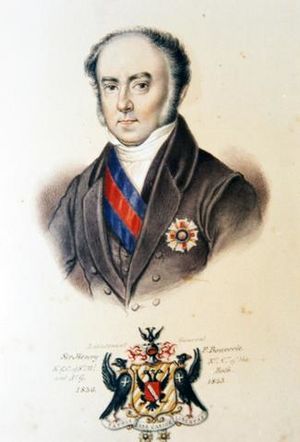Henry Bouverie facts for kids
Quick facts for kids
Sir Henry Bouverie
|
|
|---|---|
 |
|
| Born | 11 July 1783 |
| Died | November 14, 1852 (aged 69) |
| Allegiance | |
| Service/ |
|
| Rank | Lieutenant-General |
| Commands held | Northern District |
| Battles/wars | Peninsular War |
| Awards | Knight Grand Cross of the Order of the Bath Knight Grand Cross of the Order of St Michael and St George |
Sir Henry Frederick Bouverie (born July 11, 1783 – died November 14, 1852) was an important officer in the British Army. He rose to the rank of Lieutenant-General, which is a very high position in the military. He is remembered for his service in several key battles and for leading important commands.
Contents
Sir Henry Bouverie: A Military Leader
Sir Henry Bouverie came from a well-known family. His father, Edward Bouverie, was a Member of Parliament (MP). Henry went to Eton College, a famous school in England.
Starting His Army Career
In 1799, when he was just 16, Henry Bouverie joined the army. He started as a junior officer called a Cornet in the 2nd Dragoon Guards. A few months later, he moved to the Coldstream Guards, another famous army unit. He stayed with the Coldstream Guards for the rest of his time as a regimental officer.
Fighting in the Peninsular War
Sir Henry Bouverie played a big part in the Peninsular War. This was a major conflict in Europe between 1807 and 1814. For his brave actions, he received a special award called the Army Gold Cross. This award recognized his service in several important battles. These included the Battle of Salamanca, the Battle of Vitoria, the Battle of San Sebastian, the Battle of the Nive, and the Battle of Orthez.
Leading Important Commands
After his time in the Peninsular War, Sir Henry Bouverie continued to serve in high-ranking positions. In 1828, he became the General Officer Commanding the Northern Command in the United Kingdom. This meant he was in charge of all the army forces in that area. Later, in 1836, he was appointed Governor of Malta. As Governor, he was the main leader of the island of Malta, which was then part of the British Empire.
 | Toni Morrison |
 | Barack Obama |
 | Martin Luther King Jr. |
 | Ralph Bunche |

